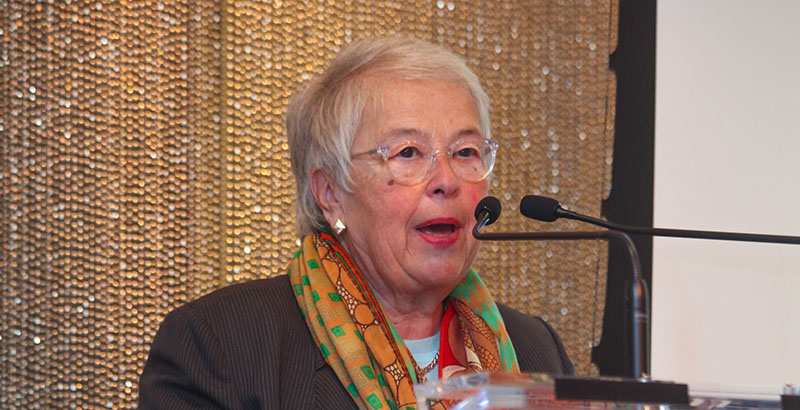Not the Same as the Old Boss: After Carmen Fariña, What Mayor De Blasio Will (and Won’t) Be Looking for in NYC’s Next Schools Chief

During her two years as the top deputy to former schools chancellor Joel Klein, Carmen Fariña wasn’t frequently seen around Tweed Courthouse, the magisterial home of New York City’s Department of Education.
Fariña spent those years between 2004 and 2006 visiting schools, meeting with teachers, principals, and district leaders, and talking to parents. She emphasized literacy (controversially), tried to improve gifted education, and led a drive to strengthen middle school performance, but she wasn’t an advocate of the large, metrics-driven efforts to convulse the system favored by Klein and his boss, Mayor Michael Bloomberg.
She wasn’t comfortable with the twinned endeavors of political sloganeering and speaking to the media. Ultimately, when she no longer saw space for her traditional songlines amid the department’s turbocharged accountability reforms, she stepped down.
Ten years later, as she prepares to retire a second time after serving as schools chief during Mayor Bill de Blasio’s first term, and at the conclusion of 50 years of service in city schools, there’s one thing we can say without having been present in any smoke-filled rooms: Mayor de Blasio got exactly what he paid for in Fariña, just as Klein did a decade earlier.
What might it presage about her successor if the mayor believes his chancellor has now outlived her usefulness? It’s not clear that de Blasio wants, or could get, a forceful personality for a second term that will likely be shaped to serve the mayor’s future political plans.
In Fariña, de Blasio landed perhaps the best-respected educator in the city’s schools: a teachers’ chancellor, an intuitionist, a Finland-level expert at diagnosing poor practice in schools and classrooms, and a Hobbesian skeptic with little regard for the capacity of parents, schools, or administrators to act well when unchecked.
Klein needed Fariña to fill the large credibility space left by Tweed’s young and largely non-educator top ranks. At the time she was a favorite but not the first choice for the position. With her accession came the iconic status she now enjoys; ironically, it made her a strong candidate when de Blasio went shopping for the top job in 2014. For the new mayor, Fariña’s luster resided in her rejection of Bloomberg’s reforms.
What de Blasio presumably knew he wasn’t getting in Fariña was precisely what the Bloomberg era specialized in: so-called “systems” thinkers who proposed complex changes that integrated separate functions across an agency. Reformers have repeatedly faulted Fariña for lacking a broad and coherent vision for change, but in fairness that’s on de Blasio. He allowed Fariña to surround herself with old teaching and learning colleagues who probably didn’t challenge her or compensate for her limitations as a leader.
Her involvement in the administration’s few big-ticket education items is unclear. Universal pre-K was birthed out of City Hall. The massive Renewal schools turnaround initiative, handicapped by de Blasio’s wild claim that it would “shake the foundations of New York City education,” was also the mayor’s brainchild. To the extent Tweed was assigned the lift, it had to carry these unrealistic expectations as well.
The program has repeatedly tripped over management issues, including a messy, mid-year rollout, the department’s refusal to provide accessible academic goals for schools for a year, and an exodus of principals who may have been suboptimal or just aggrieved — it can’t be assessed given the few details provided by the city. A December announcement — two days before Politico New York broke the news of Fariña’s departure — that 14 of the schools would close resulted in some of the worst coverage of the first term.
Some believe the coverage prompted de Blasio to accelerate Fariña’s planned exit. One city education insider, who asked not to be identified because he frequently deals with City Hall, said, “They think they’re doing great and the only problem is that Carmen isn’t selling it.” That may be true, but the mayor didn’t hire her to sell. And he had reason to know that she believes improvement takes place through modest, idea-driven initiatives like Learning Partners, which allow schools to collaborate, rather than half-billion-dollar, cookie-cutter turnaround programs for struggling schools.
It isn’t even clear that Fariña believes that Community Schools, the wraparound services model for needy students and families that Renewal is built on, is effective for school rebuilding.
What does Fariña’s experience suggest for a successor? Some advocates and City Hall watchers say they believe de Blasio won’t take on a big new initiative in the second term and wants someone who can better make the case for the change he says is already around us: preschool expansion, improved student performance and school safety, some school desegregation, improvement in low-performing schools the mayor thinks he doesn’t get credit for, and support for teachers in the form of salary increases and, in all likelihood, a new family leave provision. Bargaining begins in the spring.
It may be harder than it seems to find such an advocate. Accomplished big-city educators or state leaders won’t likely relish the idea of giving up autonomy to work under a hands-on executive who wants control over the narrative of city schools and who hardwired the city’s approach to labor unions and charter schools.
If the new person is an outsider, figure a 12-month learning curve. The mayor will be a lame duck for the final year or 18 months of his term. That leaves at most two years for meaningful work. Given how slowly change happens across 1,800 schools and 135,000 employees, two years amounts to cleaning the blackboard.
Three categories of candidates come to mind. The first is a past or present New York education leader. There are many, but few have the cachet to excite New Yorkers. Second, a major district leader or university or past elected official who sees a few years in New York City as the capstone to a successful career.
Finally, there are still those, presumably and hopefully, who think helping 1.1 million schoolchildren in New York City is too exciting and challenging, too inspiring to pass up.
Disclosure: David Cantor served as the Department of Education’s press secretary from 2005 to 2010.
Get stories like these delivered straight to your inbox. Sign up for The 74 Newsletter

;)
